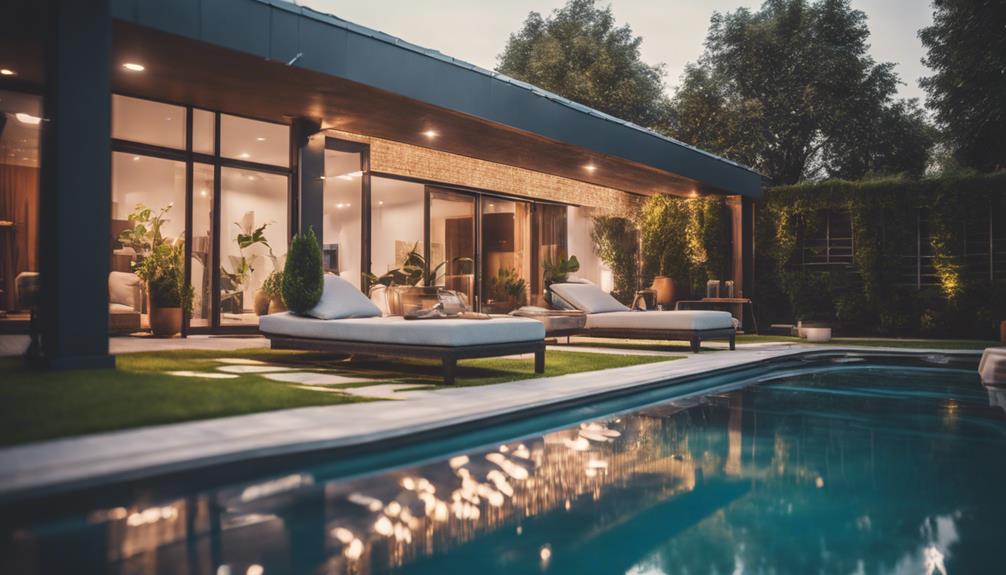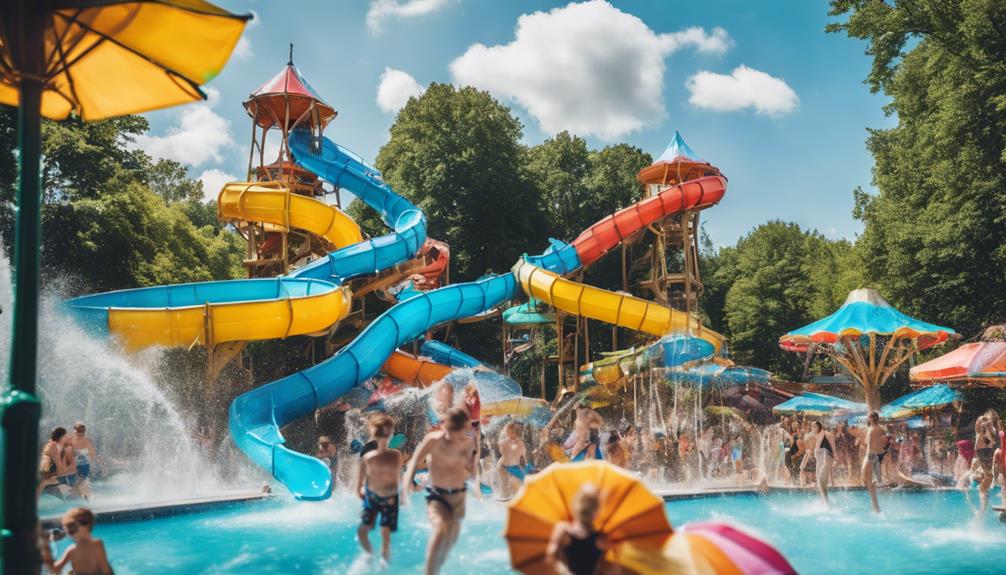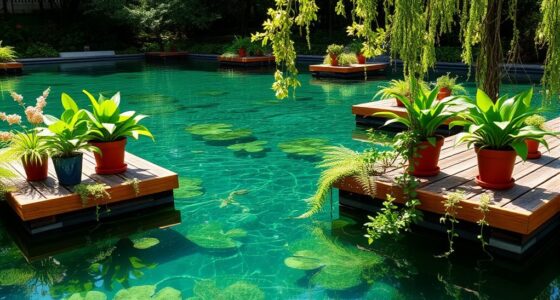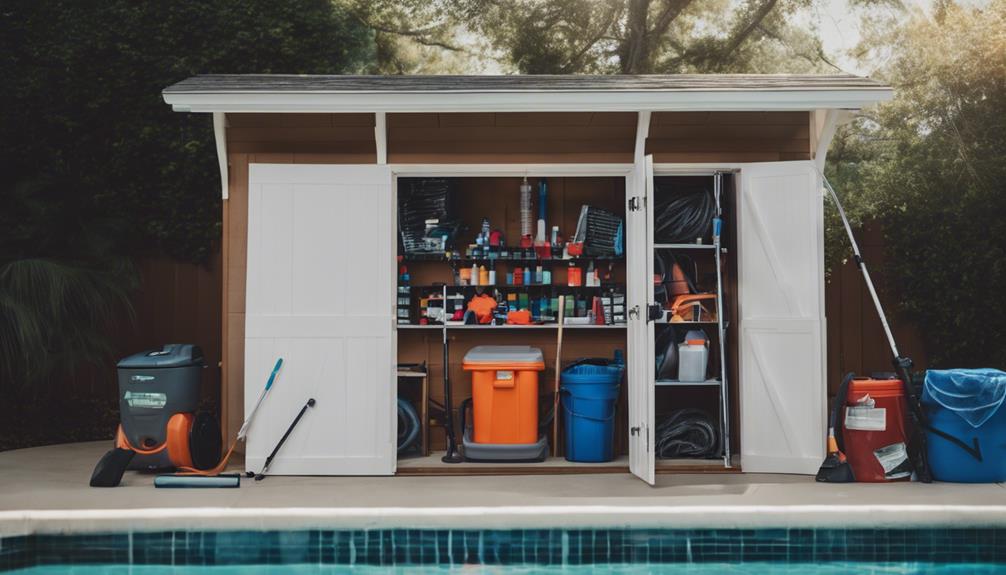Energy-efficient pools revolutionize backyard leisure by delivering substantial savings on utility bills and reducing greenhouse gas emissions. Technologies like variable-speed pumps and solar heating offer cost-effective and eco-friendly options for environmentally-conscious homeowners. Variable-speed pumps can slash energy use by over 60%, while smart pool covers and LED lighting further enhance efficiency. Automated control systems adjust filtration and heating schedules based on usage patterns and weather conditions. The future promises more innovative solutions in pool technology, focusing on sustainability and energy efficiency to provide a delightful and cost-effective pool experience.
Key Takeaways
- Energy-efficient pools reduce utility bills, offering substantial annual savings.
- Technologies like variable-speed pumps and solar heating enhance cost-effectiveness.
- Automated control systems optimize energy use based on usage patterns and weather conditions.
- Sustainable pool technology focuses on energy efficiency and eco-friendliness.
- Future pool innovations prioritize sustainability, aesthetics, and enhanced user experiences.
Financial and Environmental Benefits
Energy-efficient pools offer substantial financial and environmental benefits that make them a wise choice for homeowners seeking to reduce costs and contribute to a sustainable future.
These pools lead to lower utility bills, with studies indicating potential annual savings ranging from hundreds to thousands of dollars. By reducing energy consumption, they also play an important role in lowering greenhouse gas emissions, aiding in the global effort to combat climate change.
Not only are energy-efficient pools a smart financial investment, but they are also essential for ensuring a sustainable future for generations to come. With technologies like variable-speed pumps and solar heating, these pools deliver cost savings without compromising comfort or performance, making them a practical and eco-friendly choice for environmentally-conscious homeowners.
Key Strategies for Energy Efficiency
Efficient energy management in pools can be achieved through the implementation of key strategies that optimize performance while reducing energy consumption. These strategies play an essential role in enhancing the sustainability and cost-effectiveness of pool operations.
To maximize energy efficiency, consider the following key strategies:
- Variable-speed pumps can reduce energy use by over 60%.
- Smart pool covers minimize evaporation by 90-95%.
- LED lighting cuts power consumption notably.
- Solar heating systems utilize free energy from the sun.
- Automated control systems optimize energy use based on usage patterns and weather conditions.
Variable-Speed Pumps

Variable-speed pumps offer a significant reduction in energy consumption compared to traditional pump systems for pool operation. While traditional pumps typically consume around 2,000 watts per day, variable-speed pumps can use as little as 700 watts. This reduction can exceed 60%, leading to substantial savings on electricity bills.
The key to their efficiency lies in their ability to operate at varying speeds, adjusting to the pool's needs in real-time. By running at lower speeds for longer periods, these pumps enhance overall energy efficiency while maintaining the best pool conditions.
Consequently, variable-speed pumps not only contribute to cost savings but also play an important role in promoting sustainable and eco-friendly pool operations.
Automated Control Systems
Utilizing advanced technology, automated control systems streamline pool operations by intelligently adjusting filtration and heating schedules based on usage patterns and weather conditions. These systems enhance overall efficiency and improve energy consumption.
Key features of automated control systems include:
- Dynamic Scheduling: Tailoring filtration and heating schedules to match pool usage and weather fluctuations.
- Weather Integration: Adapting heating settings based on forecasted weather conditions.
- Energy Optimization: Maximizing energy efficiency by running systems at peak times.
- Solar Utilization: Leveraging solar gain for heating when sunlight is abundant.
- Remote Monitoring: Allowing users to manage pool operations from anywhere for convenience and control.
The Future of Backyard Leisure

Advancements in pool technology are shaping the future of backyard leisure. With a focus on sustainability and energy efficiency, the future of backyard leisure will likely see even more innovative solutions to enhance the overall pool experience.
From automated control systems that optimize energy consumption to solar heating systems harnessing the power of the sun, the future of backyard leisure will prioritize eco-friendly practices without compromising on comfort or performance.
Additionally, advancements in materials and design will likely lead to more aesthetically pleasing and functional pool structures, creating a harmonious blend of technology and nature in backyard settings.
As technology continues to evolve, the future of backyard leisure holds promise for more efficient, environmentally conscious, and enjoyable pool experiences.
Frequently Asked Questions
How Do Energy-Efficient Pools Impact Property Value?
Energy-efficient pools positively impact property value by reducing utility bills and demonstrating a commitment to sustainability. They offer potential savings of hundreds to thousands of dollars annually, making them a smart investment for homeowners.
Are There Any Tax Incentives for Installing Energy-Efficient Pool Equipment?
Tax incentives for installing energy-efficient pool equipment vary by location. Some regions offer rebates, tax credits, or deductions for eco-friendly upgrades. Check with local authorities, utility companies, and the IRS for potential savings opportunities.
Can Energy-Efficient Pools Operate in Regions With Limited Sunlight?
Energy-efficient pools can operate in regions with limited sunlight by utilizing a combination of energy-efficient technologies such as variable-speed pumps, smart pool covers, LED lighting, and automated control systems. These strategies help optimize energy use and reduce reliance on solar heating.
Do Variable-Speed Pumps Require Frequent Maintenance?
Variable-speed pumps require minimal maintenance compared to traditional pumps. Routine checks on filters and impellers are recommended, but overall, they are designed for longevity and efficiency. Proper installation and occasional servicing guarantee peak performance.
Are Automated Control Systems Compatible With All Types of Pool Setups?
Automated control systems for pools vary in compatibility depending on the setup. Most modern systems are adaptable to different pool types, offering tailored energy optimization. Consultation with a professional can guarantee seamless integration for maximum efficiency.
Conclusion
To sum up, the integration of energy-efficient technologies in residential pools offers both financial savings and environmental benefits.
For example, a family in California installed a solar heating system and LED lighting in their pool, reducing their energy consumption by 30% and saving over $500 annually on utility bills.
By embracing innovations like variable-speed pumps and smart control systems, pool owners can enjoy a sustainable and cost-effective leisure experience while contributing to a greener future.










